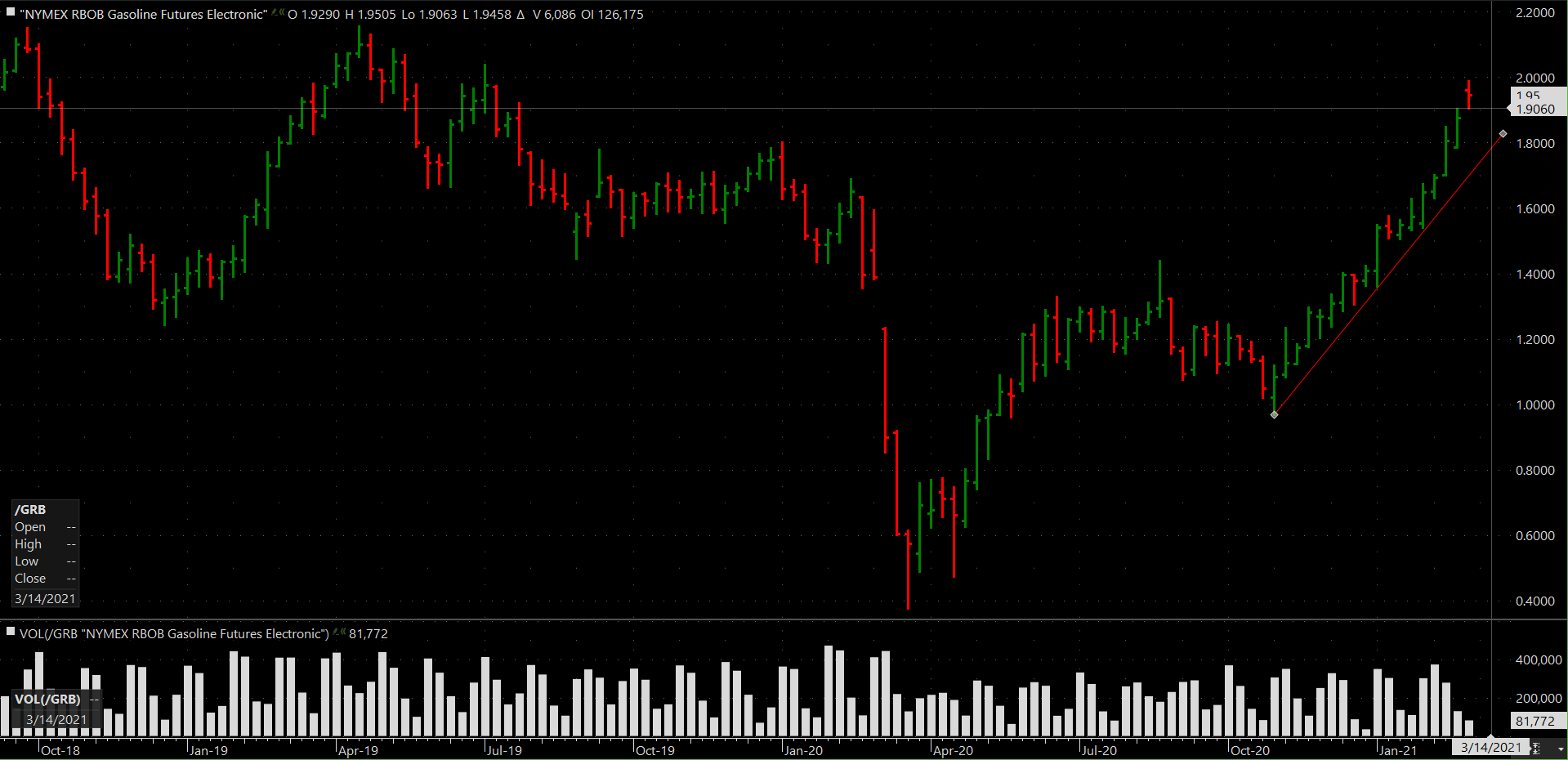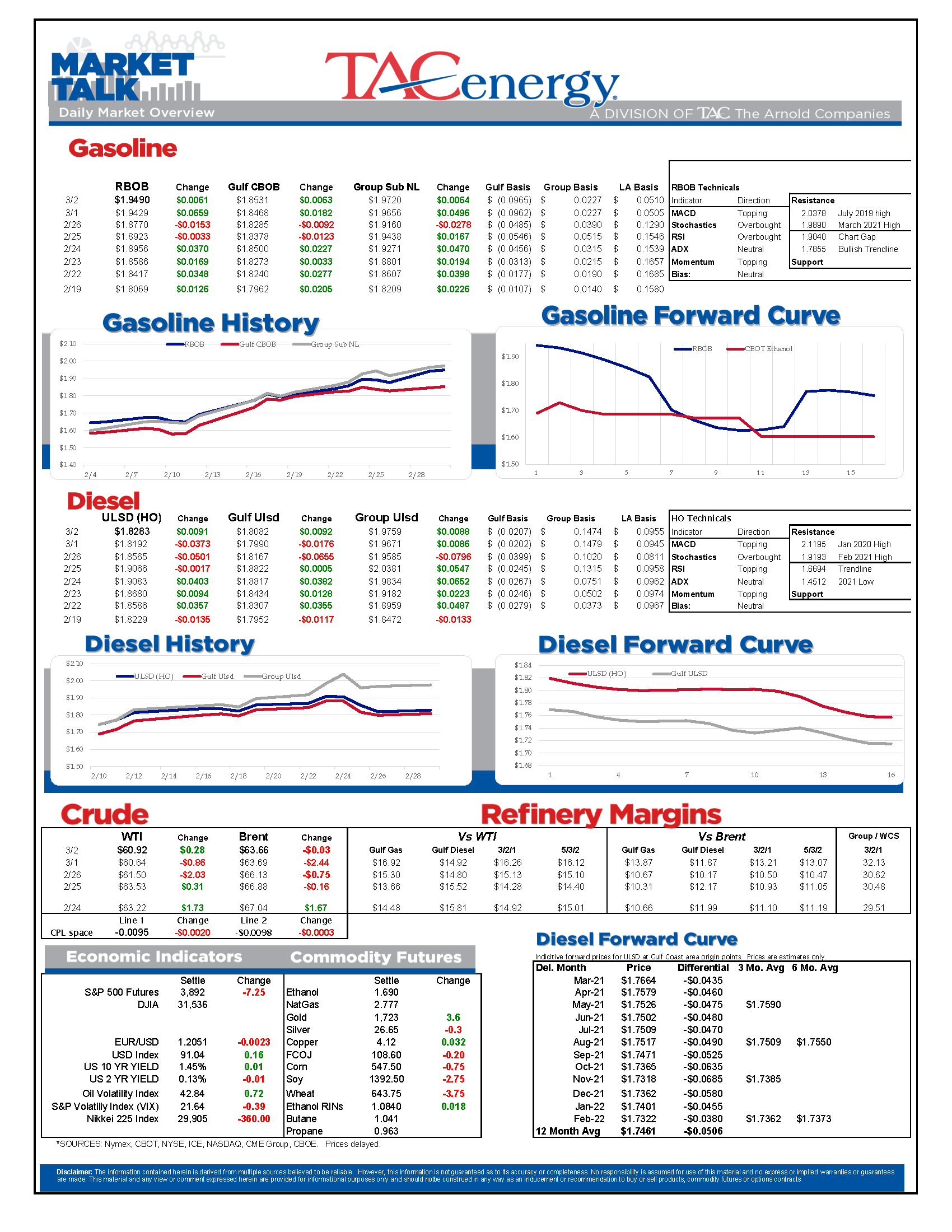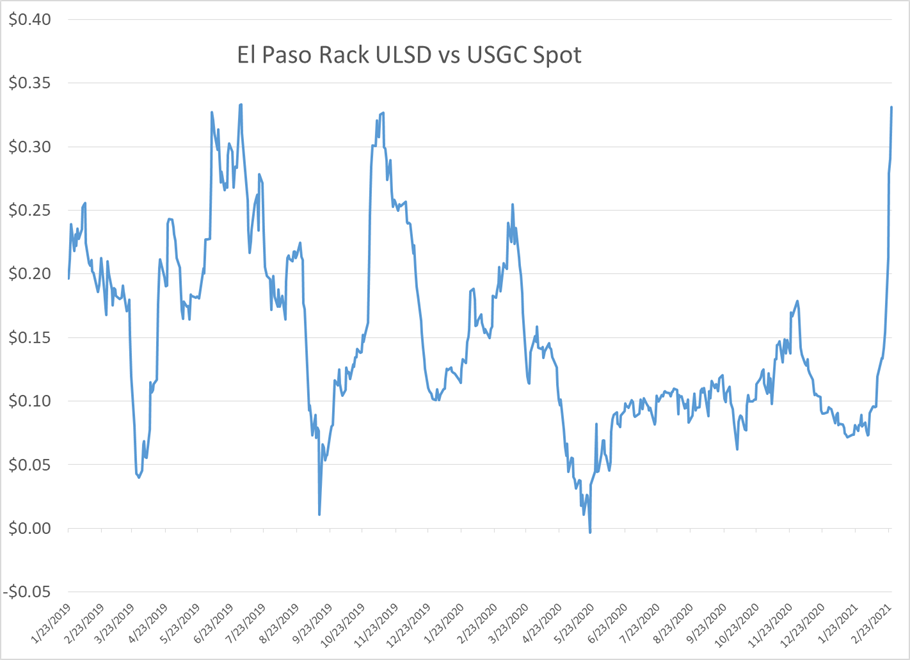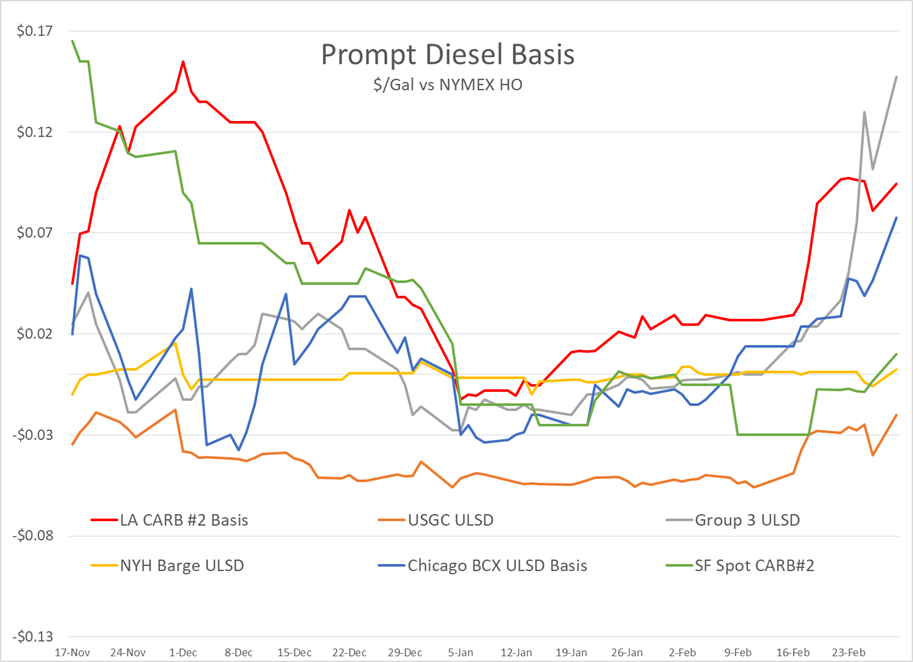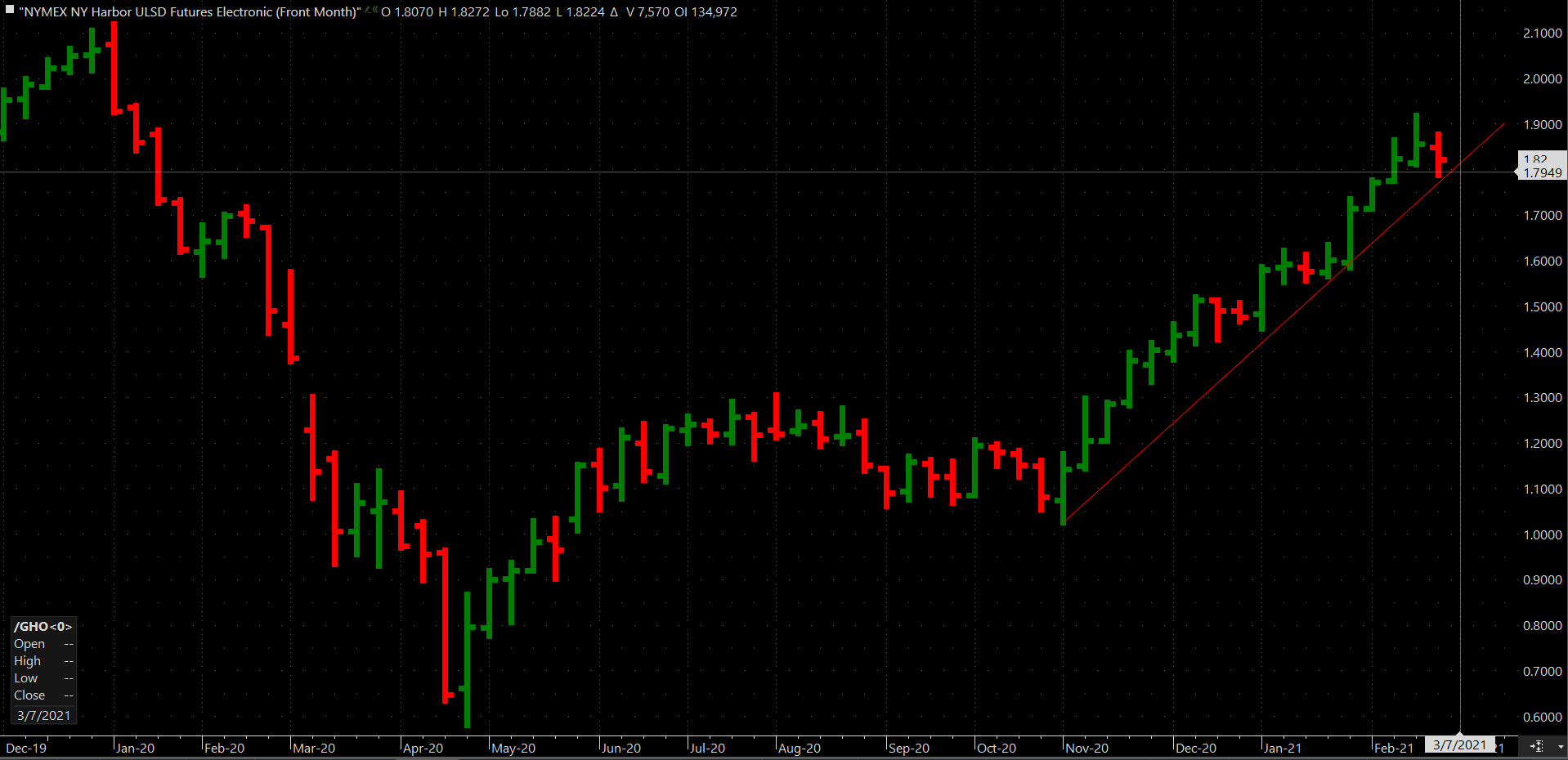Large Plants Shutter After Polar Plunge

It’s a quiet morning in energy markets, after a busy overnight session had petroleum futures on the verge of breaking their four-month-long bullish trend that has nearly doubled the value of some contracts.
Refined products dropped more than three cents overnight, and WTI dropped back below $60, but all three contracts were able to bounce and are trading slightly higher this morning. The overnight sell-off just about closed the chart gap left behind by the transition from winter to summer spec gasoline for the RBOB contract, and ULSD survived its latest test of its bullish trend line, marking the first time since the end of January we’ve seen that weekly trend face a serious test.
The refinery restarts are continuing with some of the largest plants shuttered by the polar plunge coming back online in the past several days. While those restarts are helping alleviate concerns of long term outages, it will still be weeks before we see production return to pre-storm levels, and several reported hiccups are keeping supplies tight across Texas and neighboring states for the time being. The chart below shows the dramatic change in West Texas where diesel supplies went from feast to famine since the cold snap.
Midwestern diesel values continue to spike with Group 3 values reaching their highest levels in more than four years this week as refiners scramble to replace barrels lost due to downtime of their plants, the Explorer pipeline shutting for nearly a week, or the rush to resupply Texas. It’s highly unusual for Group 3 prices to be the most expensive in the country, and is unheard of for February. The only times we’ve seen anything like this is during the fall harvest demand spike. The best cure for high prices is high prices, and we’re already seeing deliveries into the region tick up as shippers capture a rare winter arbitrage, so that price spike may only last another few days.
Things are getting personal in the public argument between refiners CVR and Delek. CVR (fka Coffeyville resources) as a major shareholder in Delek has been taking an activist stance for some time, and now this week publically questioned the CEO of Delek’s compensation package. Not going down without a fight, Delek responded that its performance over the past five years was more than 3X that of CVR and would reply to their request in due course. Does any of this matter to the supply network? Probably not unless CVR gets control of Delek and puts some of its refineries on the chopping block.
The latest in a growing list of refinery unit conversions: Shell announced plans to upgrade its hydrogen plant in Germany to help produce more power-to-liquid aviation fuel. Here’s why oil executives think demand for crude will continue to grow despite the rapidly changing refinery landscape.
Today’s interesting read: Why America needs more mines if its electric dreams are to become reality, and why that’s a huge problem for the “Green” energy movement.
Click here to download a PDF of today's TACenergy Market Talk.
Latest Posts
Markets Rallying To End The Week, Diesel Prices Lead The Way For Energy
Energy Markets Rally Again Thursday After A Choppy Wednesday Session
Week 16 - US DOE Inventory Recap
Energy Markets Trading Quietly In The Red As Ethanol Prices Rally To Five-Month High
Social Media
News & Views
View All
Markets Rallying To End The Week, Diesel Prices Lead The Way For Energy
Energy markets are rallying to end the week, with diesel prices leading the way up 2.5 cents in the early going. Equity markets are also rallying after a big Thursday selloff as strong tech earnings seem to be outweighing the FED’s favorite inflation gauge remaining stubbornly high.
RBOB gasoline futures are trading higher for a 4th straight day, but despite bouncing nearly 14 cents from Tuesday’s low, they still need to rally another nickel to break the downward sloping pattern forming on the weekly charts. Seasonal factors could go either way for gasoline for the next few weeks as we’re in the Spring peaking window, and while the high set April 12th would fit the annual pattern nicely, a May price peak is certainly not unusual, and if $2.85 is broken it seems like RBOB will run to $3 in a hurry.
Diesel prices have bounced 7 cents after touching a 5-month low on Monday but need to climb back above $2.60 to reduce the chance of a slide to $2.20 or lower should the chart support around $2.50 break down.
Back to the shadow war: After a relatively quiet few weeks in the Red Sea, Houthi attacks on ships have started again over the past few days, although so far, no major damage has been reported.
ExxonMobil reported another strong quarter in Q1 with more than $10 billion in free cash flow generated, even though earnings in its refining segment were down 67% from the first quarter of last year. The company noted the success of its Beaumont refinery expansion that came online last year and marked the only major refinery expansion in the US in over a decade. It's worth noting that within the refining segment, international earnings suffered more than domestic facilities did, with non-US refining earnings down 77% from a year ago as crack spreads came back to reality after the record-setting quarters in 2022 and 2023.
Chevron followed a similar pattern (as expected) in its Q1 report, noting strong operating cash flows of $6.8 billion in total, despite downstream earnings falling more than 56% for the quarter.
The company also highlighted its expanding marketing network along the US West and Gulf Coast markets encompassing more than 250 retail stations and highlighted its new solar-to-hydrogen project in California.
Phillips 66 continued the trend, reporting a “strong” quarter in which earnings were 63% lower than a year ago. The company highlighted the conversion of its Rodeo refinery which is now producing roughly 30mb/day of RD and is expected to ramp up to 50mb/day in the 2nd quarter. That facility had a capacity of more than 120mb/day prior to its conversion, and it used to produce gasoline along with its diesel. The company also noted its ongoing plans to sell assets that no longer fit its strategy, highlighting retail assets in Germany and Austria as being on the chopping block, while not mentioning any of its US refining assets that have long been rumored to be for sale.
Delek reported another upset at its Alon Big Spring refinery Thursday, which has become another one of the TCEQ’s frequent fliers after suffering damage from the cold snaps in both 2021 and earlier this year.
A harsh reality sinking in: Mexico’s President has made plenty of headlines with fictitious claims of energy sovereignty in the past few years, but not only is the country’s new Dos Bocas refinery still not producing finished products on any sort of meaningful scale, two of its other facilities have suffered fires recently forcing the country to import even more product from the US. This phenomenon continues to help US Gulf and West coast refiners who would be struggling (even more) to move their excess with sluggish domestic demand.
Click here to download a PDF of today's TACenergy Market Talk.

Energy Markets Rally Again Thursday After A Choppy Wednesday Session
Energy markets are trying to rally again Thursday after a choppy Wednesday session. RBOB gasoline futures are leading the push higher, on pace for a 3rd consecutive day of gains after finding a temporary floor Tuesday and have added 12 cents from those lows.
Equity markets are pointing sharply lower after a weak Q1 GDP estimate which seems to have contributed to a pullback in product prices over the past few minutes, but don’t be surprised if the “bad news is good news” low interest rate junkies start jumping in later on.
The DOE’s weekly report showed sluggish demand for gasoline and diesel, but inventory levels in most markets continue to follow their typical seasonal trends. Refinery runs held fairly steady last week with crude inputs down slightly but total gross throughputs up slightly as most facilities are now back online from a busy spring maintenance season and geared up for peak demand this summer.
Propane and propylene exports spiked to a record high north of 2.3 million barrels/day last week, which demonstrates both the US’s growing influence on global product markets, and the steady shift towards “other” products besides traditional gasoline and diesel in the level of importance for refiners.
The EIA acknowledged this morning that its weak diesel consumption estimates reflected the switch to Renewable Diesel on the West Coast, although they did not provide any timeline for when that data will be included in the weekly survey. The agency acknowledged that more than 4% of the total US consumption is now a combination of RD and Biodiesel, and that number is expected to continue to grow this year. This morning’s note also suggested that weak manufacturing activity was to blame for the sluggish diesel demand across the US, while other reports suggest the freight recession continued through Q1 of this year, which is also contributing to the big shift from tight diesel markets to oversupplied in several regions.
Valero kicked off the Q1 earnings releases for refiners with solid net income of $1.2 billion that’s a far cry from the spectacular earnings north of $3 billion in the first quarter of 2023. The refining sector made $1.7 billion, down from $4.1 billion last year. That is a pattern that should be expected from other refiners as well as the industry returns to a more normal market after 2 unbelievable years. You wouldn’t guess it by looking at stock prices for refiners though, as they continue to trade near record highs despite the more modest earnings.
Another pattern we’re likely to see continue with other refiners is that Renewable earnings were down, despite a big increase in production as lower subsidies like RINs and LCFS credit values sting producers that rely on those to compete with traditional products. Valero’s SAF conversion project at its Diamond Green joint venture is progressing ahead of schedule and will give the company optionality to flip between RD and SAF depending on how the economics of those two products shakes out this year. Valero also shows part of why refiners continue to disappear in California, with operating expenses for its West Coast segment nearly 2X that of the other regions it operates in.

